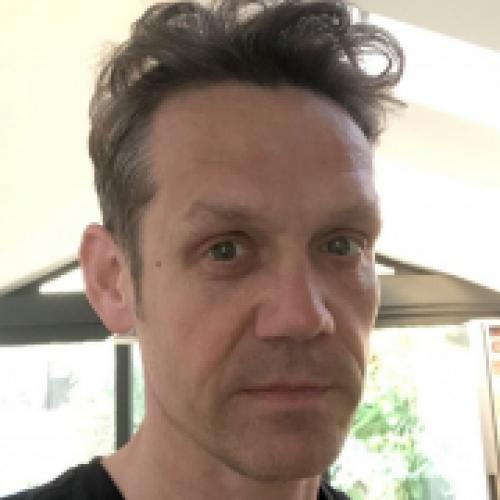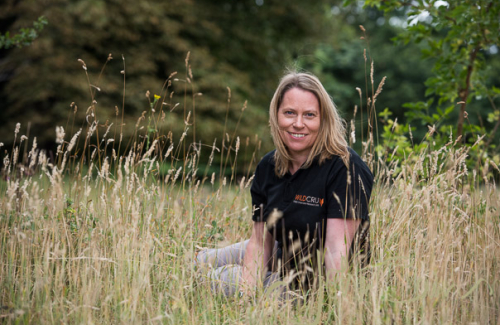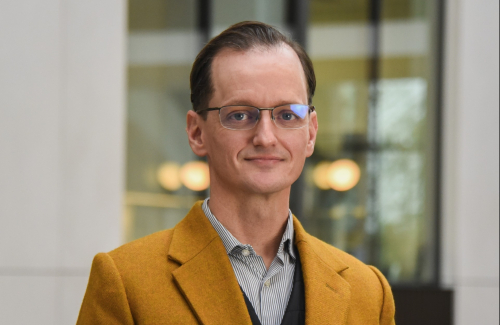
Professor Scott Waddell FMedSci FRS
I studied biochemistry as an undergraduate at the University of Dundee, and researched cancer biology for my Ph.D. at the University of London. After postdoctoral study in the Department of Brain and Cognitive Sciences at Massachusetts Institute of Technology I spent 10 years leading a research group in the Department of Neurobiology at the University of Massachusetts Medical School. I was recruited to Oxford as a Professor of Neurobiology and founding member of the Centre for Neural Circuits & Behaviour in November 2011. I was appointed as a Senior Research Fellow at Pembroke College in 2014.
My group studies neural circuit properties of motivated and memory-directed behaviours, using the fruit fly Drosophila. We have generated cellular resolution understanding of the formation, consolidation, state-dependent retrieval, and revaluation of memory. This work has revealed operating principles of dopaminergic systems. Our studies use genetic manipulations, molecular biology, physiological measurements of neural activity and behavioural analyses. We have recently pioneered the application of single-cell transcriptomics to study of the fly brain, and with collaborators have generated a synaptic resolution wiring diagram, or connectome, of a large chunk of the fly brain. We are also interested in how transposons diversify the neural transcriptome, cellular function, and might create differences in the behaviour of individual animals.
I lecture on the MSc course in Neuroscience, and give an annual presentation to FHS Neuroscience students. The lab hosts FHS project students and I am happy to offer ad hoc tutorials covering my research areas.
I am a Fellow of the Royal Society, a Fellow of the Academy of Medical Sciences, a member of EMBO, and I was awarded the 2014 Liliane Bettencourt Prize for the Life Sciences.
Other interests
Fanatic cyclist of large mountains, runner, and when ballots permit, veteran extreme triathlete.
V. Croset, C. D. Treiber, S. Waddell (2018). Cellular diversity in the Drosophila midbrain revealed by single-cell transcriptomics. eLife Apr 19;7: e34550. doi: 10.7554/eLife.34550.
J. Felsenberg, P. F. Jacob, T. Walker, O. Barnstedt, A. J. Edmondson-Stait, M. W. Pleijzier, N. Otto, P. Schlegel, N. Sharifi, E. Perisse, C. S. Smith, J. S. Lauritzen, M. Costa, G. S. X. E. Jefferis, D. D. Bock, S. Waddell. (2018). Integration of parallel opposing memories underlies memory extinction. Cell 175: 709-722.
P. Jacob and S. Waddell. (2020). Spaced training forms complementary memories of opposite valence in Drosophila. Neuron 106: 977-991.
N. Otto, M.W. Pleijzier, I. C. Morgan, A. J. Edmondson-Stait, K.J. Heinz, I. Stark, G. Dempsey, M. Ito, I. Kapoor, J. Hsu, P.M. Schlegel, A.S. Bates, L. Feng, M. Costa, K. Ito, D.D. Bock, G.M. Rubin, G.S.X.E. Jefferis, S. Waddell. (2020). Input connectivity reveals additional heterogeneity of dopaminergic reinforcement in Drosophila. Current Biology 30: 3200-3211.
C.D. Treiber and S. Waddell. (2020). Transposon expression in the Drosophila brain is driven by neighboring genes and diversifies the neural transcriptome. (2020). Genome Research 30:1559-1569.
Y. Wu. Y. Funato, E. Meschi, K.D. Jovanoski, H. Miki, S. Waddell. (2020). Magnesium efflux from Drosophila Kenyon cells is critical for normal and diet-enhanced long-term memory. eLife Nov 26;9:e61339. doi: 10.7554/eLife.61339.
F. Li, J. Lindsey, E. C. Marin, N. Otto, M. Dreher, G. Dempsey, I. Stark, A. S. Bates, M. W. Pleijzier, P. Schlegel, A. Nern, S. Takemura, T. Yang, A. Francis, A. Brain, R. Parekh, M. Costa, L. Scheffer, Y. Aso, G. S. X. E. Jefferis, L. F. Abbott, A. Litwin-Kumar, S. Waddell, G. M. Rubin (2020). The connectome of the adult Drosophila mushroom body: implications for function. eLife Dec 14;9:e62576. doi: 10.7554/eLife.62576.
P.F. Jacob, P. Vargas-Gutierrez, Z. Okray, S. Vietti-Michelina, J. Felsenberg, S. Waddell. (2021). Prior experience conditionally inhibits the expression of new learning in Drosophila. Current Biology 31: 3490-3503.
Gliotransmission of D-serine promotes thirst-directed behaviors in Drosophila. (2022). A. Park, V. Croset, N. Otto, D. Agarwal, C.D. Treiber, E. Meschi, D. Sims, S. Waddell. Current Biology S0960-9822(22)01175-7. doi: 10.1016/j.cub.2022.07.038.
Multisensory learning binds neurons into a cross-modal memory engram. (2023).
Z. Okray, P.F. Jacob, C. Stern C, K. Desmond, N. Otto, C.B. Talbot, P. Vargas-Gutierrez, S. Waddell. Nature 617(7962):777-784. doi: 10.1038/s41586-023-06013-8.
Dopaminergic systems create reward seeking despite adverse consequences. (2023). K.D. Jovanoski, L. Duquenoy, J. Mitchell, I. Kapoor, C.D. Treiber, V. Croset, G. Dempsey, S. Parepalli, P. Cognigni, N. Otto, J. Felsenberg, S. Waddell. Nature 623(7986):356-365. doi: 10.1038/s41586-023-06671-8.
link to departmental page for full list:
Departmental website:
https://www.dpag.ox.ac.uk/research/waddell-group
Lab featured in The Guardian/Observer:
Make your own memories: one day you’ll be able to replace the bad ones with good ones, Philip Ball
https://www.theguardian.com/science/2014/oct/12/memory-how-science-fiction-can-become-reality
Interview with Scott for Prix Liliane Bettencourt pour les sciences du vivant 2014:
https://www.youtube.com/watch?v=NrVx8CraycM&list=PLKHtGBAQvM_7uMkY7-10gCdptLPECKZpT&index=7&t=6s
Work on water reward and thirst featured in The New Yorker by Jonathan Weiner, author of Time, Love and Memory.
http://www.newyorker.com/tech/elements/thirsty-mind
Interview with Scott on memory enhancing role of dietary Magnesium:
https://www.thenakedscientists.com/articles/interviews/memory-improves-magnesium
News from Biology
Professor Scott Waddell FMedSci FRS

I studied biochemistry as an undergraduate at the University of Dundee, and researched cancer biology for my Ph.D. at the University of London. After postdoctoral study in the Department of Brain and Cognitive Sciences at Massachusetts Institute of Technology I spent 10 years leading a research group in the Department of Neurobiology at the University of Massachusetts Medical School. I was recruited to Oxford as a Professor of Neurobiology and founding member of the Centre for Neural Circuits & Behaviour in November 2011. I was appointed as a Senior Research Fellow at Pembroke College in 2014.
My group studies neural circuit properties of motivated and memory-directed behaviours, using the fruit fly Drosophila. We have generated cellular resolution understanding of the formation, consolidation, state-dependent retrieval, and revaluation of memory. This work has revealed operating principles of dopaminergic systems. Our studies use genetic manipulations, molecular biology, physiological measurements of neural activity and behavioural analyses. We have recently pioneered the application of single-cell transcriptomics to study of the fly brain, and with collaborators have generated a synaptic resolution wiring diagram, or connectome, of a large chunk of the fly brain. We are also interested in how transposons diversify the neural transcriptome, cellular function, and might create differences in the behaviour of individual animals.
I lecture on the MSc course in Neuroscience, and give an annual presentation to FHS Neuroscience students. The lab hosts FHS project students and I am happy to offer ad hoc tutorials covering my research areas.
I am a Fellow of the Royal Society, a Fellow of the Academy of Medical Sciences, a member of EMBO, and I was awarded the 2014 Liliane Bettencourt Prize for the Life Sciences.
Other interests
Fanatic cyclist of large mountains, runner, and when ballots permit, veteran extreme triathlete.
V. Croset, C. D. Treiber, S. Waddell (2018). Cellular diversity in the Drosophila midbrain revealed by single-cell transcriptomics. eLife Apr 19;7: e34550. doi: 10.7554/eLife.34550.
J. Felsenberg, P. F. Jacob, T. Walker, O. Barnstedt, A. J. Edmondson-Stait, M. W. Pleijzier, N. Otto, P. Schlegel, N. Sharifi, E. Perisse, C. S. Smith, J. S. Lauritzen, M. Costa, G. S. X. E. Jefferis, D. D. Bock, S. Waddell. (2018). Integration of parallel opposing memories underlies memory extinction. Cell 175: 709-722.
P. Jacob and S. Waddell. (2020). Spaced training forms complementary memories of opposite valence in Drosophila. Neuron 106: 977-991.
N. Otto, M.W. Pleijzier, I. C. Morgan, A. J. Edmondson-Stait, K.J. Heinz, I. Stark, G. Dempsey, M. Ito, I. Kapoor, J. Hsu, P.M. Schlegel, A.S. Bates, L. Feng, M. Costa, K. Ito, D.D. Bock, G.M. Rubin, G.S.X.E. Jefferis, S. Waddell. (2020). Input connectivity reveals additional heterogeneity of dopaminergic reinforcement in Drosophila. Current Biology 30: 3200-3211.
C.D. Treiber and S. Waddell. (2020). Transposon expression in the Drosophila brain is driven by neighboring genes and diversifies the neural transcriptome. (2020). Genome Research 30:1559-1569.
Y. Wu. Y. Funato, E. Meschi, K.D. Jovanoski, H. Miki, S. Waddell. (2020). Magnesium efflux from Drosophila Kenyon cells is critical for normal and diet-enhanced long-term memory. eLife Nov 26;9:e61339. doi: 10.7554/eLife.61339.
F. Li, J. Lindsey, E. C. Marin, N. Otto, M. Dreher, G. Dempsey, I. Stark, A. S. Bates, M. W. Pleijzier, P. Schlegel, A. Nern, S. Takemura, T. Yang, A. Francis, A. Brain, R. Parekh, M. Costa, L. Scheffer, Y. Aso, G. S. X. E. Jefferis, L. F. Abbott, A. Litwin-Kumar, S. Waddell, G. M. Rubin (2020). The connectome of the adult Drosophila mushroom body: implications for function. eLife Dec 14;9:e62576. doi: 10.7554/eLife.62576.
P.F. Jacob, P. Vargas-Gutierrez, Z. Okray, S. Vietti-Michelina, J. Felsenberg, S. Waddell. (2021). Prior experience conditionally inhibits the expression of new learning in Drosophila. Current Biology 31: 3490-3503.
Gliotransmission of D-serine promotes thirst-directed behaviors in Drosophila. (2022). A. Park, V. Croset, N. Otto, D. Agarwal, C.D. Treiber, E. Meschi, D. Sims, S. Waddell. Current Biology S0960-9822(22)01175-7. doi: 10.1016/j.cub.2022.07.038.
Multisensory learning binds neurons into a cross-modal memory engram. (2023).
Z. Okray, P.F. Jacob, C. Stern C, K. Desmond, N. Otto, C.B. Talbot, P. Vargas-Gutierrez, S. Waddell. Nature 617(7962):777-784. doi: 10.1038/s41586-023-06013-8.
Dopaminergic systems create reward seeking despite adverse consequences. (2023). K.D. Jovanoski, L. Duquenoy, J. Mitchell, I. Kapoor, C.D. Treiber, V. Croset, G. Dempsey, S. Parepalli, P. Cognigni, N. Otto, J. Felsenberg, S. Waddell. Nature 623(7986):356-365. doi: 10.1038/s41586-023-06671-8.
link to departmental page for full list:
Departmental website:
https://www.dpag.ox.ac.uk/research/waddell-group
Lab featured in The Guardian/Observer:
Make your own memories: one day you’ll be able to replace the bad ones with good ones, Philip Ball
https://www.theguardian.com/science/2014/oct/12/memory-how-science-fiction-can-become-reality
Interview with Scott for Prix Liliane Bettencourt pour les sciences du vivant 2014:
https://www.youtube.com/watch?v=NrVx8CraycM&list=PLKHtGBAQvM_7uMkY7-10gCdptLPECKZpT&index=7&t=6s
Work on water reward and thirst featured in The New Yorker by Jonathan Weiner, author of Time, Love and Memory.
http://www.newyorker.com/tech/elements/thirsty-mind
Interview with Scott on memory enhancing role of dietary Magnesium:
https://www.thenakedscientists.com/articles/interviews/memory-improves-magnesium

